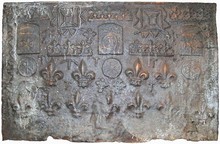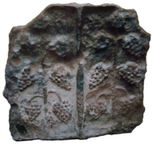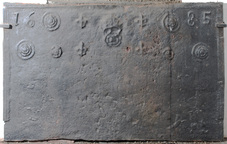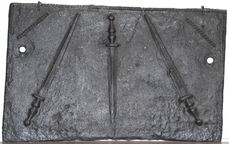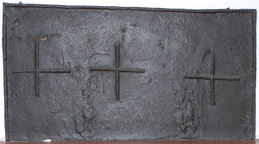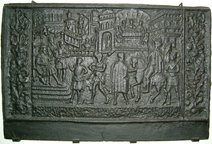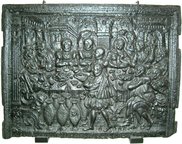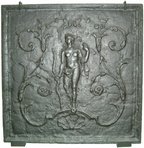-
713
Description: Rectangular; twisted rope edging (top and sides); top row, two square-within-a-square arrangements of twisted rope between three stamps formed of Gothic tracery cresting; 2nd row, two more tracery cresting stamps between two crowned, star-embossed butter mould stamps with a crowned rose-en-soleil stamp in the middle; 3rd row, three star-embossed butter mould stamps with two pairs of fleurs-de-lys between them; bottom row, seven fleurs-de-lys; plus intersepersed fragments of cresting and short rope lengths, a vertical arrangement of cresting fragments down the right side and a vertical, zig-zag arrangement of rope lengths on the left side.
Notes: The rose-en-soleil was the badge of King Edward IV and, thus, a Yorkist symbol. Many of the stamps employed on this fireback are seen, with other stamps, on a wide variety of firebacks, suggesting a common source; similar gothic tracery cresting can be seen as pierced cresting on a rare late-Medieval, wooden Easter sepulchre at the redundant church of St Michael at Cowthorpe, North Yorkshire. A similar fireback is at Anne of Cleves House, Lewes (no. 371). Christie's auction, 24 May 2001.
Copies of this fireback are known.
- Decoration tags:
- rectangular (shape)
- rope (edging)
- simple stamps
- carved stamps
- heraldic
- objects
Manufactured: in the mid- to late-16th century possibly at Pounsley Furnace, Framfield in the Weald area of England.
Current location: not known.
-
847
Description: Originally rectangular; two identical panels, each with braid edging, a vine standard with six bunches of grapes and a cluster at the top.
Notes: One of an unusual series formed from separate panels arranged, in this instance, with repeated panel; fire-damaged, hence the distorted shape. Recovered after the fire at Nymans, Handcross, Sussex in 1947.
- Decoration tags:
- rectangular (shape)
- simulated rope (edging)
- carved pattern panels
- plants
Manufactured: in the late-16th century in the Weald area of England.
Current location: not known.
- Attached to series:
- Armada series
-
906
Description: Rectangular; cyma recta moulded edging in short lengths (top and sides, with gap at bottom of each side); top centre, rose and crown between four small fleurs-de-lys (2 over 2); date split in top corners, with concentric roundel inside, next to upper fleurs; below date, concentric roundel, with small rose inside, next to lower fleurs; the whole arrangement symmetrical.
Notes: The only example of this series with no initials; one vertical plankline. The style of rose and crown is similar to that used in gun founding in the Tudor period, suggesting that the furnace that was the source of this fireback may have been previously used for that purpose.
Inscription: 16 85
- Decoration tags:
- rectangular (shape)
- complex, furniture-derived (edging)
- simple stamps
- carved stamps
- individual numbers
- planklines
- heraldic
- royal
- text
- objects
Manufactured: in 1685 in the Weald area of England.
Current location: in private hands, Upper Beeding, West Sussex, England.
- Attached to series:
- 1660s-90s Wealden series
- Fleur-de-lys firebacks
-
727
Description: Rectangular; twisted rope edging (top and sides); canted rope lengths across top corners; three impressions of a rondel dagger (c. 410mm) with a baluster-turned grip, the middle one per fess, pommel in chief, the other two on either side, per bend, points in chief.
Notes: The arrangement of daggers is similar to the arms of Vigures, of Launceston, Cornwall, but inverted; the plate has been pierced on each side for fixing to the back of the fireplace; the dagger (length approx. 41cm) may be of German design.
- Decoration tags:
- rectangular (shape)
- rope (edging)
- simple stamps
- objects
Manufactured: in the mid- to late-16th century possibly in the Weald area of England.
Current location: Victoria & Albert Museum, Cromwell Road, Kensington & Chelsea, Greater London, England.
Museum number: 896.1901 (part of the Victoria & Albert Museum museum group)
- Attached to series:
- Knife & Dagger stamp firebacks
-
728
Description: Quasi-rectangular; twisted rope edging (top and sides); across the centre, three crosses formed of the repeated stamping of a length of twisted rope.
Notes: The edging appears to have been formed of the same length of rope. The crosses almost certainly have Christian significance.
- Decoration tags:
- rectangular (shape)
- simple stamps
- apotropaic
- objects
Manufactured: in the 16th century possibly in the Weald area of England.
Current location: Victoria & Albert Museum, Cromwell Road, Kensington & Chelsea, Greater London, England.
Museum number: 887.1901 (part of the Victoria & Albert Museum museum group)
- Attached to series:
- Rope design firebacks
-
729
Description: Rectangular; flanged edge; central pictorial panel illustrating Mordecai arriving before King Ahasuerus, Haman hanging from the gallows behind; two floral side panels, at the top of each a monogram within a cartouche: on the left KS, on the right H?D; plain extension panel at bottom.
Notes: Stoveplate; the scene illustrates a scene from Esther 7: 10 and 8: 1.
Copies of this fireback are known.
Inscription: KS H[?]D
- Decoration tags:
- rectangular (shape)
- flanged (edging)
- whole carved pattern
- extension panels
- pictorial
- biblical
- architectural
- text
- animals
- humans
Manufactured: in the late-16th to early-17th century possibly in the Eifel area of Germany.
Current location: Victoria & Albert Museum, Cromwell Road, Kensington & Chelsea, Greater London, England.
Museum number: M.112-1953 (part of the Victoria & Albert Museum museum group)
- Attached to series:
- Stoveplates
- Esther stoveplates
-
730
Description: Rectangular; flanged fillet edging; single date stampo above a pictorial scene showing the cricifixion with members of the Holy family, soldiers and onllokers surrounding the three crosses; kinscription betlow separating a separate pictorial panel illegible through corrosion; a single letter 'I' in top right corner.
Notes: A characteristic stove-plate of the period.
Copies of this fireback are known.
Inscription: 1574 I / INRI / MATTEUS AM 27 CAPITEL
- Decoration tags:
- rectangular (shape)
- flanged (edging)
- whole carved pattern
- individual letters
- pictorial
- biblical
- text
- humans
Manufactured: in 1574 possibly in the Sudeifel area of Germany.
Current location: Victoria & Albert Museum, Cromwell Road, Kensington & Chelsea, Greater London, England.
Museum number: M.126-1914 (part of the Victoria & Albert Museum museum group)
Citation: Anon., 2 Dec 1905, 'Old Kent and Sussex Fire-backs', Country Life, pp. 767-768.
- Attached to series:
- Stoveplates
-
731
Description: Rectangular with flanged edging and a moulded frame; pictorial scene of the Marriage at Cana in an architectural setting; inscription along bottom edge.
Notes: The pattern-maker is believed to be Master Ronnung.
Inscription: HISTORIA VON DER HOCHZEIT ZV CANA IN GALILEA ...
- Decoration tags:
- rectangular (shape)
- flanged (edging)
- whole carved pattern
- pictorial
- biblical
- text
- humans
- objects
Manufactured: in the late-16th century possibly in the Harz area of Germany.
Current location: Victoria & Albert Museum, Cromwell Road, Kensington & Chelsea, Greater London, England.
Museum number: 319.1897 (part of the Victoria & Albert Museum museum group)
Citation: Dawson, C., 1903, 'Sussex Iron Work and Pottery', Sussex Archaeological Collections, 46, pp. 1-54.
Citation: Gardner, J. S., 1898, 'Iron Casting in the Weald', Archaeologia, 56, 1, pp. 133-164.
- Attached to series:
- Stoveplates
- Marriage at Cana stoveplates
-
732
Description: Rectangular; cavetto edging all round; seated lion on right, its tail rising above its back and its head turned to face the viewer; a seated sheep on the left.
Notes: Intended to represent the saying, ‘The lion shall lie down with the lamb’, a popular misquotation of Isaiah 11: 6. Some variants are dated 1679 (see no. 481).
Copies of this fireback are known.
- Decoration tags:
- rectangular (shape)
- cavetto (edging)
- whole carved pattern
- pictorial
- biblical
- animals
Manufactured: in the mid- to late-17th century in the Weald area of England.
Current location: Victoria & Albert Museum, Cromwell Road, Kensington & Chelsea, Greater London, England.
Museum number: 894.1901 (part of the Victoria & Albert Museum museum group)
- Attached to series:
- Small cavetto series
- Old Testament & Apocrypha firebacks
-
734
Description: Rectangular; wide fillet and cavetto-moulded edging; female figure holding a bow, with a quiver of arrows on her back, standing on a scallop shell; foliate swirls on each side.
Notes: The figure is that of Diana or Artemis.
- Decoration tags:
- rectangular (shape)
- fillet and cavetto (edging)
- whole carved pattern
- pictorial
- mythological
- humans
Manufactured: in the early-18th century in France.
Current location: Victoria & Albert Museum, Cromwell Road, Kensington & Chelsea, Greater London, England.
Museum number: M.114-1929 (part of the Victoria & Albert Museum museum group)
- Attached to series:
- Miscellaneous pattern firebacks
